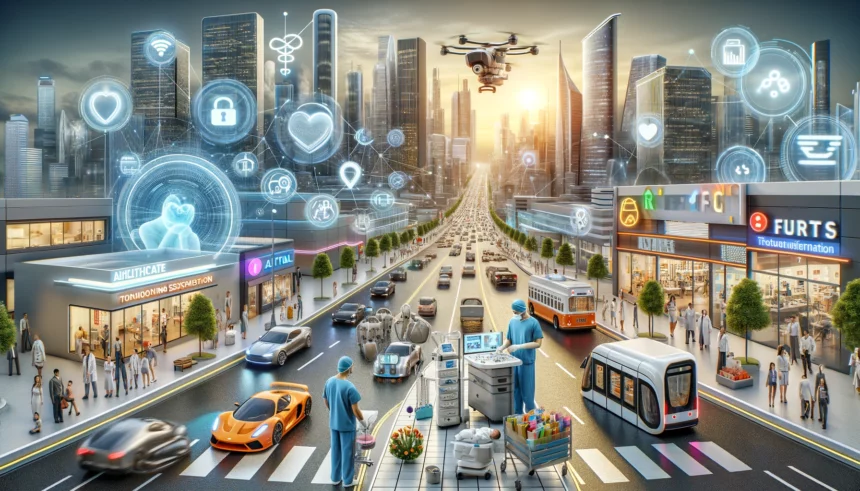Introduction
Artificial Intelligence (AI) has transitioned from science fiction to a tangible part of our everyday lives. From personalized streaming recommendations to efficient customer service bots, AI is changing how we interact with technology. In this article, we’ll explore the profound impact of AI on our daily lives, its benefits, challenges, and what the future holds.
Understanding AI in Our Daily Lives
AI is everywhere, often in ways we don’t even notice. It’s behind the scenes, optimizing various sectors like healthcare, transportation, and retail. Here’s how AI is making a difference:
- Voice Assistants: Devices like Amazon’s Alexa and Google Home help us manage our schedules, control smart home devices, and answer questions.
- Predictive Algorithms: These help in everything from online shopping recommendations to predicting traffic patterns and weather forecasts.
Understanding AI’s role helps us appreciate its benefits and recognize challenges such as data privacy and algorithm biases.
AI in Healthcare
AI is transforming healthcare by improving diagnostics, personalizing treatment, and enhancing patient care. Key advancements include:
- Diagnostic Tools: AI analyzes medical data to identify potential health risks and assist in early disease detection.
- Personalized Treatments: AI helps in creating treatment plans tailored to individual patients.
- Robotic Surgeries: These improve precision and outcomes, reducing recovery times and complications.
Embracing AI in healthcare streamlines workflows, reduces errors, and makes healthcare more efficient and cost-effective.
AI in Transportation
Transportation is undergoing a revolution thanks to AI. Here’s how:
- Autonomous Vehicles: These enhance road safety by reducing human error.
- Traffic Management: AI optimizes traffic flow and reduces congestion.
- Predictive Maintenance: AI analyzes data to foresee and prevent infrastructure failures, ensuring smoother operations.
AI in transportation means safer, more efficient travel, and a significant reduction in emissions.
AI in Retail and Customer Service
Retail and customer service sectors are leveraging AI to enhance the shopping experience:
- Personalized Recommendations: AI suggests products based on individual preferences, increasing customer satisfaction.
- Chatbots: These provide immediate customer support, answering questions and resolving issues quickly.
- Inventory Management: AI predicts demand, helping retailers manage stock more efficiently.
This not only boosts sales but also enhances customer loyalty and streamlines operations.
Ethical Considerations of AI
Despite its benefits, AI brings several ethical challenges:
- Data Privacy: With AI analyzing vast amounts of data, protecting personal information is crucial.
- Algorithm Bias: AI systems can inherit biases present in their training data, leading to unfair outcomes.
- Job Displacement: Automation could lead to job losses in certain sectors.
Developing ethical standards and ensuring transparency in AI decision-making are essential to mitigate these issues.
The Future of AI
The future of AI is both exciting and challenging. Potential advancements include:
- Enhanced Personal Assistants: More intuitive and helpful AI-driven personal assistants.
- Advanced Healthcare Solutions: Even more precise diagnostic tools and personalized treatment options.
- Autonomous Transportation: Widespread use of self-driving cars and drones.
However, it’s crucial to balance these advancements with ethical considerations, ensuring responsible development and deployment.
Conclusion
AI’s impact on daily life is profound and far-reaching. As it continues to evolve, the opportunities for innovation are immense, offering solutions to complex problems and opening new possibilities. However, we must remain vigilant about ethical concerns, prioritizing responsible AI development. By staying informed and proactive, we can harness the benefits of AI while mitigating potential risks, ensuring a future where technology truly augments our lives responsibly.
















